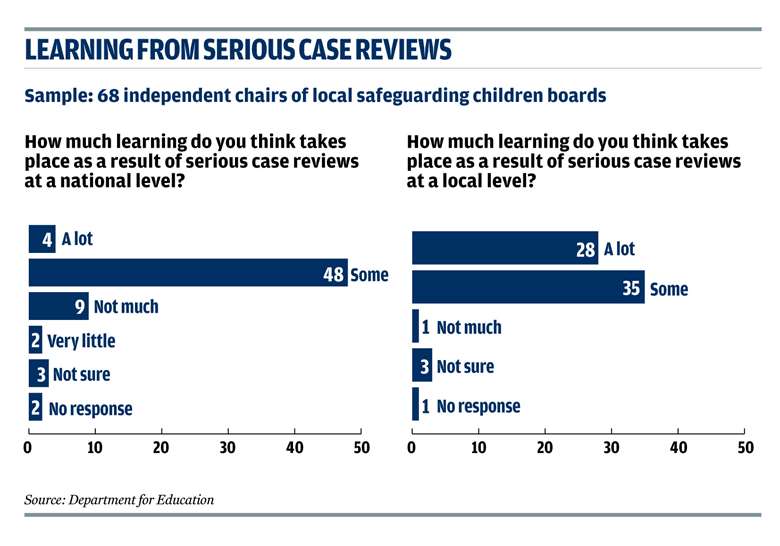Research Report: A Study to Investigate the Barriers to Learning from Serious Case Reviews
Charlotte Goddard
Monday, August 18, 2014
A research team from Kingston University investigated barriers to learning from serious case reviews, and examined ways to overcome these problems.

DOWNLOAD A PDF OF THIS GRAPHIC
Authors Anne Rawlings, Paty Paliokosta, Daryl Maisey, Jessica Johnson, Jenny Capstick and Professor Ray Jones, Kingston University Institute for Child Centred Interprofessional Practice
Published by Department for Education, July 2014
SUMMARY
A research team from Kingston University was commissioned by the Department for Education to investigate barriers to learning from serious case reviews (SCRs). They wanted to identify ways of overcoming these barriers, and ways to ensure any learning was taken forward and embedded in policy and practice.
The team surveyed 68 independent chairs of local safeguarding children boards between May and July 2013, and ran focus groups with 78 professionals from a range of disciplines, as well as undertaking a review of current literature and research.
The survey of independent chairs found they were much more likely to believe learning from serious case reviews took place at a local rather than a national level, with 41 per cent saying a lot of learning took place at a local level but only 5.8 per cent believing the same happened at national level. In the focus groups, 38.4 per cent of participants acknowledged SCRs helped improve child protection policy and practice a little, and 33.4 per cent said they helped a lot. Only two per cent thought they did not help much.
The study - A Study to Investigate the Barriers to Learning from Serious Case Reviews and Identify ways of Overcoming these Barriers - found barriers cited by independent board chairs included: a culture seeking to apportion blame rather than learn from past mistakes; professional, organisational and cultural resistance, such as a feeling of "it couldn't happen here"; and the role of the media in determining what gets given attention through selective coverage of the findings of serious case reviews. The chairs said any learning that came from serious case reviews tended to result in more guidance and processes and have little visible impact on frontline practice. Other barriers to learning included people being overwhelmed by the demands of their day jobs, and the serious case review process being too lengthy, costly and repetitive. On top of that, the findings of SCRs were often inaccessible to professionals across different sectors due to a lack of common language, and findings from different reviews were difficult to compare with each other.
The majority of respondents said learning from serious case reviews would be made easier by a process that would help to collate, analyse and disseminate lessons learned nationally, with a focus on context so learning could be considered against local circumstances.
They said lessons should be made explicit, practicable and relevant to frontline practice and practitioners.
When asked what worked best in ensuring learning comes out of SCRs, responses included the need to use every opportunity to share learning, especially with practitioners, such as the wide distribution of summaries of key issues constantly referred to by all agencies. Other best practice cited included avoiding apportioning blame by undertaking the SCR in as supportive a manner as possible and making it clear there was an expectation SCRs would be disseminated.
IMPLICATIONS FOR PRACTICE
The researchers make a number of recommendations as to how their findings could impact on practice. They suggest the appropriateness of SCRs as a learning tool should be reviewed, and call for the establishment of a national database of review summaries under key themes, as well as the dissemination of regular themed reports. They recommend inspections should assess the impact of serious case reviews on practice and details of learning, and practice changes, following SCRs should be captured in local and national reporting structures.
FURTHER READING
The Munro Review of Child Protection: Final Report - A Child Centred System, Professor Eileen Munro, May 2011. An independent review of child protection in England, which proposed a "systems approach" for all serious case reviews, to counteract a "blame culture" and develop a way of working that encourages people to collaborate.
Ages of Concern: Learning Lessons From Serious Case Reviews. A Thematic Report of Ofsted's Evaluation of Serious Case Reviews From 1 April 2007 To 31 March 2011, Ofsted, October 2011. An analysis of 482 serious case reviews.
New Learning From Serious Case Reviews: A Two Year Report For 2009-2011, Marian Brandon, Peter Sidebotham, Sue Bailey, Pippa Belderson, Carol Hawley, Catherine Ellis and Matthew Megson, University of East Anglia and University of Warwick, April 2013. The sixth two-yearly national analysis of serious case reviews.
First Annual Report, National Panel of Independent Experts on Serious Case Reviews, July 2014. This report examines the quality of serious case reviews and the decisions made on whether to initiate them.




